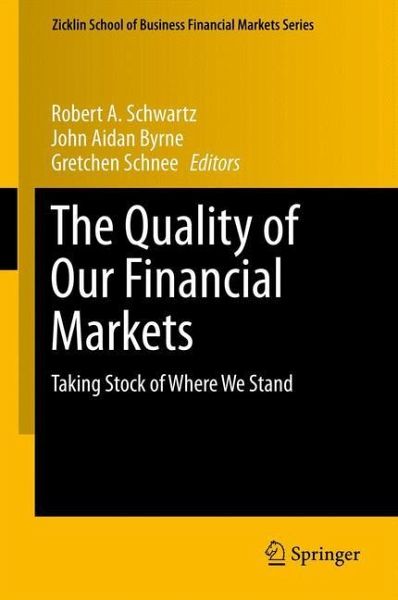
The Quality of Our Financial Markets
Taking Stock of Where We Stand
Herausgegeben: Schwartz, Robert A; Byrne, John Aidan; Schnee, Gretchen

PAYBACK Punkte
57 °P sammeln!
The structure and operations of the US equity markets have evolved dramatically in recent decades with the advent of major technology and regulatory changes. Nothing short of a groundbreaking shift has occurred in the securities industry as the transition has been made from predominantly manual, human intermediated trading to predominantly electronic trading. By many measures, commission, spreads and market impact costs have been dramatically reduced in recent years. But does that mean that market quality has improved? That is the key question addressed in this book, titled after the Baruch Co...
The structure and operations of the US equity markets have evolved dramatically in recent decades with the advent of major technology and regulatory changes. Nothing short of a groundbreaking shift has occurred in the securities industry as the transition has been made from predominantly manual, human intermediated trading to predominantly electronic trading. By many measures, commission, spreads and market impact costs have been dramatically reduced in recent years. But does that mean that market quality has improved? That is the key question addressed in this book, titled after the Baruch College Conference, "The Quality of Our Financial Markets: Taking Stock of Where We Stand." Featuring contributions from a distinguished panel of practitioners, academicians, and regulators, this volume offers a penetrating and timely account of the most current issues in market quality, covering such topics as high-frequency trading; the Flash Crash of May 6th, 2010; dark pools; lit pools; fragmentation; disruptive and advanced technologies. And, very significantly, it takes a close look at the impact and influence of regulation.
The Zicklin School of Business Financial Markets Series presents the insights emerging from a sequence of conferences hosted by the Zicklin School at Baruch College for industry professionals, regulators, and scholars. Much more than historical documents, the transcripts from the conferences are edited for clarity, perspective and context; material and comments from subsequent interviews with the panelists and speakers are integrated for a complete thematic presentation. Each book is focused on a well delineated topic, but all deliver broader insights into the quality and efficiency of the U.S. equity markets and the dynamic forces changing them.
The Zicklin School of Business Financial Markets Series presents the insights emerging from a sequence of conferences hosted by the Zicklin School at Baruch College for industry professionals, regulators, and scholars. Much more than historical documents, the transcripts from the conferences are edited for clarity, perspective and context; material and comments from subsequent interviews with the panelists and speakers are integrated for a complete thematic presentation. Each book is focused on a well delineated topic, but all deliver broader insights into the quality and efficiency of the U.S. equity markets and the dynamic forces changing them.














